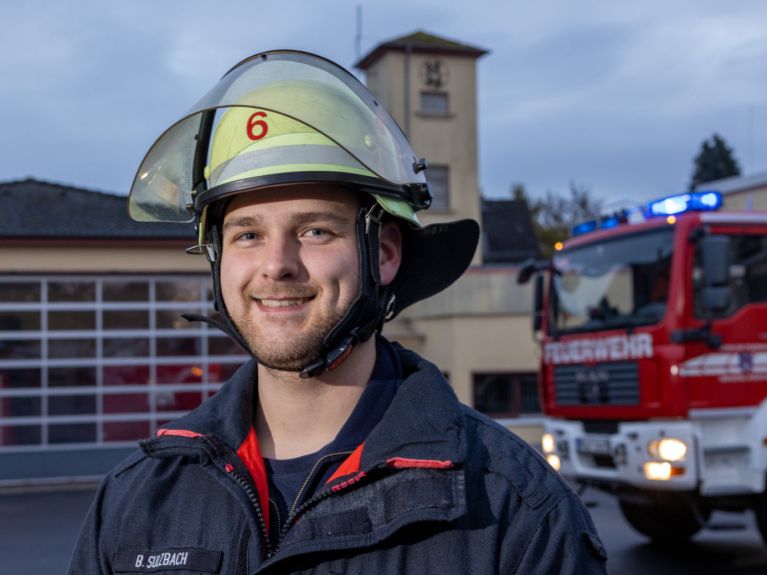“We are ready to go into action at any time”
Voluntary fire services: Benedikt Sulzbach explains why he loves volunteering, even though it makes considerable demands on him.

Benedikt Sulzbach (29), a member of the voluntary fire service, explains why he is happy to help:
“I was four years old when I first joined my local voluntary fire brigade in Oberursel-Stierstadt. My father was a firefighter and I was absolutely fascinated by the red fire engines with their flashing lights and sirens. After leaving the mini fire brigade, I joined the youth fire brigade at the age of ten - you get proper training there. I was able to take part in my first proper call-out when I was 17.
I did an apprenticeship as an electrician and work at the Rolls Royce aircraft engine plant. I’m a member of the works fire brigade there - there are 21 of us working shifts around the clock. If I’m called out to a fire outside the plant during the day, I’m given time off by my company. Obviously, this only applies to major fires or if human lives are at risk. My colleagues fully support my voluntary role and do my work for me while I’m out on call. Often I also have to attend training courses or exercises; you are given time off work for that by law.
After a call-out I always have the satisfaction of knowing that I was able to help.
My first big fire was in 2013. A fire had broken out at the community centre in the neighbouring village. We had to evacuate the tower block next door. Eight brigades were involved and there were more than 200 of us in all, including the Red Cross and Federal Agency for Technical Relief. The call-out that distressed me most was when an 18-year-old climbed on top of a suburban railway train as a dare and came too close to the high-voltage line. He suffered an electric shock and severe burns. We couldn’t use ladders to get on top of the train because everything was electrified, so he had to manoeuvre himself off the train and let himself fall onto a safety cushion. After that call-out I wasn’t able to sleep at night. I talked to a more experienced colleague about it, and that helped. Emergency psychosocial support services are also available for firefighters, however. What I like about the fire brigade nonetheless is that after a call-out I always have the satisfaction of knowing that I was able to help. And that things could have been much worse if we hadn’t arrived on the scene so quickly.
There is no other association that can organise parties as well as the voluntary fire brigade can. We approach parties with just the same precision and speed as we do our work. And you make some great friends. The fire brigade really is like a second family for me. If I give someone a call and say “I need you”, all they will ask is, “When do you need me to be there?”
Preventing fires in the first place
What sets us apart from professional fire brigades in big towns and cities is the fact that none of us is actually at the fire station - we are all at work or home, but are ready to go into action at any time, no matter where we are. Seven of our 50-strong team are women. I also go into clubs, nurseries and schools to teach people about fire prevention. We tell them about the right way to contact the fire brigade and explain what can be done to prevent fires in the first place.
Once we have extinguished the fire, we help the emergency medical services by carrying things, resuscitating victims, cordoning off accident sites or getting people down the ladder from the upper stories of a building. In many cases we have to break down doors or pump out flooded basements after heavy rain. We often work as security personnel during major events at stadiums or concerts.”
Fire services in Germany
The fire brigade can be reached from any phone by calling 112.
There are three types of fire service: every small town or village has a voluntary fire brigade that is maintained by the municipality. Germany’s 23,297 voluntary fire brigades have more than a million members. They are complemented by 23,934 youth fire brigades with 332,000 members.
In addition to the voluntary fire services, there are 116 professional fire brigades with 35,754 professional firefighters in larger cities across Germany. They also provide emergency rescue services.
The third type is to be found in companies, where there are 761 works fire brigades with 33,616 firefighters.






